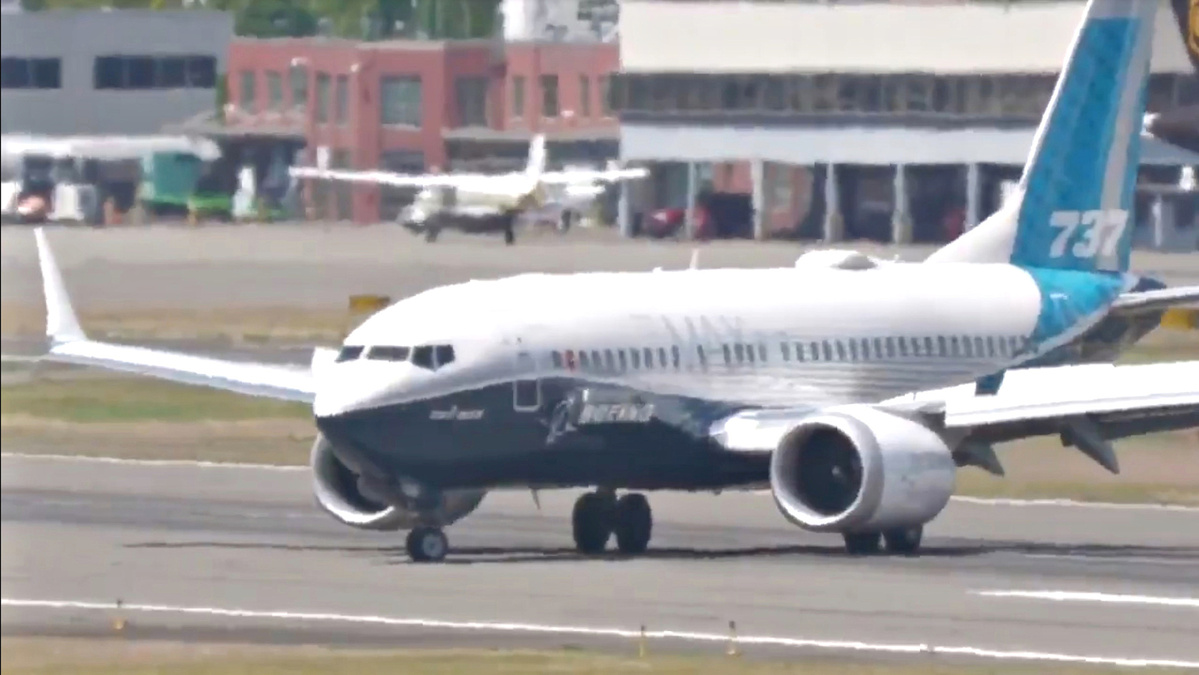Report faults Boeing over 737 certification
By SCOTT REEVES in New York | China Daily Global | Updated: 2020-07-06 11:20

Boeing failed to submit needed certification records to the US Federal Aviation Administration (FAA) showing changes to the Boeing 737 MAX's flight control system blamed for two fatal crashes, a government report has concluded.
The flight control system, called Maneuvering Characteristics Augmentation System (MCAS), was "not an area of emphasis" on the MAX because Boeing characterized it as a modification of existing controls rather than as a new device, the US Department of Transportation's Office of Inspector General, said in a 52-page report released last week.
Boeing decided as early as 2013 to characterize the new system as a modification to minimize the need for additional training as part of the company's goal of limiting costs to customers, the report said.
As a result, the FAA approved the 737 MAX for commercial service without a clear understanding of how the MCAS worked and problems it could pose to pilots who weren't fully trained in its function or how to override it in an emergency.
But the MCAS became more powerful as design of the 737 MAX progressed, and FAA officials told the Office of Inspector General they had made important decisions about the device without knowing that it has been extensively altered, the report said.
Moreover, final certification of the MAX's control system in 2016 included some tests using the older, less powerful version of MCAS because Boeing was still modifying the system's software, the report said.
The Inspector General will make recommendations to the FAA later this year.
The Department of Transportation investigates the causes of accidents. The FAA regulates the manufacture and use of commercial and private aircraft.
The MAX, Boeing's best-selling jet, has been grounded worldwide since March 2019 following crashes in Indonesia and Ethiopia that killed a total of 346 passengers and crew.
The new, heavier engines on the MAX were moved closer to the fuselage and that changed the in-flight handling characteristics of the plane. At times, the nose of the plane pitched up, and that could lead to a midair stall. Boeing added the MCAS to compensate.
Investigators believe the MAX's automated anti-stall MCAS device erroneously pointed the nose of the planes down to avoid a midair stall that could precede a fatal plunge leading to crashes in Indonesia and Ethiopia.
The Inspector General's report covers activities from the initial steps in certifying the MAX in January 2012 through the second crash.
The report includes allegations of "undue pressure" from Boeing on those certifying the MAX's safety.
The Inspector General also reviewed the FAA's oversight of Boeing through Organization Designation Authorization, a program that grants manufacturers such as Boeing the authority to perform much of the work on the certification of its products.
Critics believe the FAA relied too heavily on Boeing engineers when certifying the MAX. But others say new technology quickly outpaces the ability of government regulators to evaluate it and therefore must rely on company engineers.
In a statement, Boeing said it cooperated fully with the investigation and welcomed it.
"Since the accidents, multiple committees and governmental authorities have examined issues related to the MAX, and in response to their findings and our own internal reviews, we have made substantial changes within our company to further enhance our commitment to safety," Boeing said.
"We are committed to transparency with the FAA during all aspects of the airplane certification process and have made significant changes to improve and support that regulatory process."
Representative Peter DeFazio, chairman of the House Transportation Infrastructure Committee, which has held five hearings on the MAX, said in a statement:
"This IG report reinforces some of the findings of our committee's ongoing investigation, which has revealed a number of disturbing patterns, including Boeing's efforts to conceal critical information from regulators in its rush to get the MAX to market."
The Inspector General's report was released as FAA pilots and Boeing officials completed three days of test flights on the MAX's updated MCAS system, a vital step in recertification of the aircraft for commercial service.
FAA Director Steve Dickson, a former military and commercial pilot, said he won't recertify the MAX for commercial flight until he personally flies the plane and tests the new software on a flight simulator.
Boeing had hoped to have the plane back in the air by this summer, but that now appears unlikely.
In the past, foreign regulators often accepted the FAA's decision, but other nations may impose additional requirements to recertify the MAX, further delaying its return to service.























